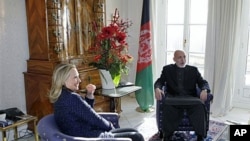One decade ago, diplomats gathered in Bonn, Germany, to appoint a transitional government in Afghanistan. Now, with international combat forces set to leave in 2014, more than 100 delegations have come to Bonn for a conference on the future of Afghanistan.
The focus of the Bonn conference is to shift away from an Afghanistan in transition toward an Afghanistan transformation.
Delegates are discussing three key areas, including the transfer of security responsibilities from international to Afghan forces, political reconciliation and long-term international engagement, including aid and training.
German Foreign Minister Guido Westerwelle reflected on the decade since the initial conference in 2001.
“There have been setbacks. Not all of our objectives and expectations have been realistic. And yet, we have achieved a lot. Most [More] Afghans now enjoy more freedom, peace and security than at any time in the past 30 years," said Westerwelle.
Noting gains made
Afghanistan President Hamid Karzai highlighted that Afghan women make up 20 percent of the civil service sector, more than a quarter of parliament, and nearly 40 percent of students in schools. Overall, school enrollment rose from less than one million in 2002 to more than 8 million now. The Afghan president added that more roads have been built in the past 10 years than in his nation’s history.
Karzai said he was grateful to the international community for its support, but he noted the fragility of the advancements.
“The challenges that remain are significant and have the potential to derail our progress and reverse our achievements. Poverty and underdevelopment are still our top challenges. Our young democracy remains fragile, and the Afghan people are yet to see their aspirations realized through strong, effective and accountable national institutions,” he said.
Karzai said the political process remains open to Taliban and other militants who renounce violence and accept the Afghan constitution.
He added that his nation will require continued financial support through the next decade. An Afghan transition strategy paper circulating at the conference said the work of the past 10 years could come undone unless Afghanistan’s significant fiscal gap is addressed.
Clinton pledges ongoing US support
U.S. Secretary of State Hillary Clinton said the United States will resume contributing to the Afghanistan Reconstruction Trust Fund. That funding was suspended earlier this year due to irregularities with the Kabul Bank that have since been addressed.
"The United States is prepared to stand with the Afghan people for the long haul to support this transition to sustainable stability and growth, and we recognize that the Afghans themselves, as the president has said, have commitments that they must meet, taking difficult decisions to embrace reform, lead in their own defense, and strengthen an inclusive democracy rooted in the rule of law.”
Clinton praised the Afghan president’s commitment to proceed with inclusive elections in 2014. She also said the United States and international partners must remain committed to training and advising Afghan forces.
Afghanistan’s neighbor, Pakistan, was notably absent from the conference, declining to come in protest of NATO air strikes last month that killed 24 Pakistani troops near the Afghan border.
Clinton said the entire region has a stake in Afghanistan’s future and Pakistan’s contributions to the conference would have been beneficial.
Bonn Conference Focuses on Afghan Transformation




